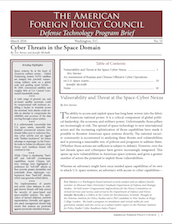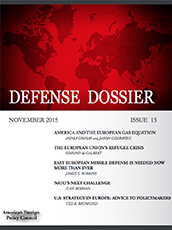Russia Reform Monitor: No. 2019
A fresh casualty in Ukrainian-Russian tensions;
Back to the KOMSOMOL
A fresh casualty in Ukrainian-Russian tensions;
Back to the KOMSOMOL
Escaped blimp may end JLENS program;
Moscow flexes its missile muscles...;
...while Washington focuses on defense;
China augments space warfare arsenal;
Turkey makes a choice
Moscow's economic worries continue to mount;
In the Russian army, no Dagestanis needed
On November 12, in an interview with ABC’s George Stephanopoulos, President Obama waxed optimistic about the current state of U.S. counterterrorism strategy. His administration’s efforts over the past year had successfully “contained” the Islamic State, Obama said. “I don’t think they’re gaining strength.”
Historic Xi-Ma meeting;
China to sell Russia S-400s, Su-35s
Kurds retake Sinjar;
Saudi coalition advances on Taez, Yemen;
UAE takes 5 Yemenis from Guantanamo;
Turkey says it warned France of Paris attackers
Europeans compete to woo China Crackdown on human rights lawyers, activists continues
Runaway inflation... and positive thinking;
Moscow eyes the Americas
As we contemplate the complex diplomacy that created the recent agreement between the international community and Iran regarding the Islamic Republic's nuclear future, it is worth remembering Thomas Friedman's momentarily famous remark of a few years ago that, whatever else it may be, Iran is also a country ripe for catalytic political change. In passing this judgment, the New York Times columnist took special note of Iran's youthful and vibrant population, the deep knowledge base of Iranian society as a whole, and its interconnectedness with the outside world.
A throwback to Soviet oversight of science;
Terror attempts, counterterrorism operations on the upswing
Kabul to buy Helos from Delhi, despite Pak concerns;
China's top brass to tour Pakistan and India;
Islamic State joins Taliban splinter group in Afghanistan;
India calls for South China Sea code of conduct
Beijing is bullish on Iran. In meetings there earlier this month, we heard senior government and party officials express uniform support and optimism in their assessment of the nuclear agreement struck this summer between the Islamic Republic and the P5+1 powers, terming it "good for Iran and good for the world."
The first part is certainly true. Iran has emerged as the undisputed winner of the long-running negotiations with the West over its nuclear ambitions.
Riyadh versus Moscow in Syria;
New restrictions on official travel, media funding
Al-Qaeda pushes back;
Hezbollah's growing arsenal...and why Israel worries;
The Islamic State sets its sights on the Kremlin...;
...as Moscow takes stock
Premier Li sought to resign in 2015?;
Communist Party releases new disciplinary rules for members
Applications for government service decline;
Official: China interfering in Myanmar peace process
Iran lauds Pak for not joining Yemen war;
Afghanistan seeking arms from Russia;
Pakistan gets free jets from Turkey;
India, Sri Lanka begin drills
Russia builds up its nuke arsenal, despite New START;
The real costs of Putin's Ukraine campaign

What is the role of cybersecurity in the conduct of war and ongoing security operations? Policymakers, academics, and journalists often think of cybersecurity as a single domain problem. That is to say, they view cyber operations as taking place solely within its own domain—one that is separate from land, sea, air or space. This perspective, however, overlooks the fact that computer systems and networks pervade society and the physical environment, and are present to some degree in all physical environs and across the three levels of war (strategic, operational, and tactical). Modern militaries employ forces in a “joint” manner, combining the specific platforms and technologies of different services to achieve a more effective force. National security policymakers should similarly see both kinetic and cyber capabilities as part of a broad set of tools available to achieve their objectives. Thinking of cybersecurity as a limited or separate space, wholly distinct from the other domains of conflict, limits the potential for understanding its strategic utility...
High energy hopes in Moscow, despite Syria;
Blowback from Russia’
s air campaign
PAK PM Sharif visits Washington;
India wants to double defense exports;
India eyes S-400 Triumf air defence missile systems;
Sri Lanka attempts to repair relations with China;
UN: Taliban at its strongest in Afghanistan in 2001
Like the optimistic boy in Ronald Reagan's charming quip who searches through pile-high manure in hopes of finding a pony, the Obama administration continues trying to entice the cooperation of Iran on regional issues even in the face of its growing hostility toward the United States.
Over the past few months, a new and divisive word has begun provoking debate across China. That word is niguo, translated as "your country", and it is the most prominent of a new lexicon of words that both mainland and overseas Chinese are using online to distance themselves from the injustice, bigotry and bad behaviour that have become commonplace in China. Lacking an open arena within which to freely express their opinions on important matters that affect their lives, a new generation of tech-savvy Chinese is using niguo to rhetorically opt out of the system and distance themselves from the Communist Party.

America And The European Gas Equation
The European Union's Refugee Crisis
East European Missile Defense Is Needed Now More Than Ever
Nato's Next Challenge
U.S. Strategy In Europe: Advice To Policymakers
U.S. raid frees 70 ISIS prisoners;
FSA rebels reject Russian support;
Turkish clash with ISIS leaves police and suspects dead;
South Sudan makes progress toward peace;
U.S. approves $11B warship sale to Saudi
Global Times warns US on artificial islands;
Chinese researcher wins Nobel Prize
Sundanese ground troops boost Saudi-led coalition;
Assad forces begin advance on Aleppo;
UAE may seek to enrich Uranium;
Turkey shoots down drone near border;
Yemen to attend UN-sponsored talks with the Houthis
Russian troops could be deployed to Afghan border;
Pakistan, Russia sign gas pipeline agreement;
India backs Philippines on South China Sea row;
Sri Lanka will welcome ships from all countries
Iran's mixed economic bag;
New horizons for the Russian-Iranian alliance;
Legal troubles for the JCPOA;
Iran's costly campaign in Syria
What is the Kremlin up to in Syria?;
Underestimating Russia's military
Last Sunday, Iran and the P5+1 countries (the U.S., U.K., France, China, Russia, and Germany) formally adopted the new nuclear agreement concluded this summer. In coming days, under the terms of the deal, formally known as the Joint Comprehensive Plan of Action (JCPOA), the Islamic Republic is obliged to begin implementing a series of curbs on its nuclear program.
A show of force in the Eastern Mediterranean;
A veritable exodus of Russians
Russia's new southwestern barrier;
U.S. inches into Boko Haram fight;
The Taliban, resurgent
Explosions in Turkey kill 95;
Security Council extends UN mission in South Sudan;
Egypt signs deals for French warships;
Russia and Saudia Arabia reach an accord on Syria;
Evidence of Russian cluster-bomb use in Syria
U.S. freedom of navigation operations could take the U.S.-China relationship past a point of no return.
South Sudan rebels reject creation of 28 new states;
ISIS militants attack main Libyan oil port;
ISIS executes 70 Sunni tribesmen;
Egypt supports Russian military moves in Syria;
Military situation in Syria continues to escalate
China sends special envoy to Sri Lanka to mend ties;
Islamic state group training Russian-born fighters in Afghanistan;
Modi pushes 'obsolete' plane on reluctant military;
US Gen. in Afghanistan: Afghan Security Forces 'could potentially collapse';
Pakistan denies China provided armed drones
The global response to recent Palestinian terror in Israel highlights the world's appallingly exceptional treatment of the Israeli-Palestinian conflict, one that infantilizes both sides and only encourages more terror.
Those who oppose the gift or sale of defensive weapons to Ukraine have long rested their argument on a simple supposition: that any level of help the West might muster will inevitably be exceeded by Russian military escalation. After all, they argue, Ukraine is more important to Russia than it is to the United States. Lost in this argument, though, is the clear fact that Ukraine is more important to Ukrainians than it is to Russians - including many Ukrainians who are Russian speakers and/or ethnically Russian.
Russian troops fear the Syrian front;
Brain drain, Russian style
Indonesia chooses China for high-speed rail project;
China arrests two Japanese on spying charges
Changes to Japan’
s constitution;
China sets more limits on cash withdrawals overseas
On a leafy street in the Ukrainian capital, just steps from the ornate building that houses the country's parliament, sits what is perhaps the nation's most powerful weapon in its protracted battle of ideas with Russia. There, tucked away in a once beautiful tsarist-era building, are the offices of the Ukrainian National Memory Institute. It is a tiny government agency with a massive mandate: to counter decades of Russian intellectual disinformation.
“
Xi keeps a tight grip on authority”
New “
journalistic ethics committees”
ordered for each province
Crimea and the population question;
New hacking... and cooperation with Iran
Don't believe the hype surrounding Russia's involvement in Syria. Ever since President Vladimir Putin launched a major escalation of the 4 1/2-year-old conflict there last month, Western media has been awash with commentary about the Kremlin's strategy, with most interpreting it as a function of Moscow's strength — and Washington's weakness.
It's an image that the Kremlin is eager to stoke, for obvious political reasons. Yet Russia's intervention in Syria also carries serious downsides for the Kremlin — negatives that are likely to come back to haunt Russia's leaders in the not-too-distant future
New steps toward Nordic security;
A comeback for "
United Russia"
?
Unlike some critics of the Afghan war, I do not believe the conflict was unjust or doomed to failure. I simply agree with the assessment of the U.S. director of national intelligence in 2009: “No improvement in Afghanistan is possible without Pakistan taking control of its border areas.”
Foreign media firms eye the exits;
Russia's military settles in on the Ukrainian border